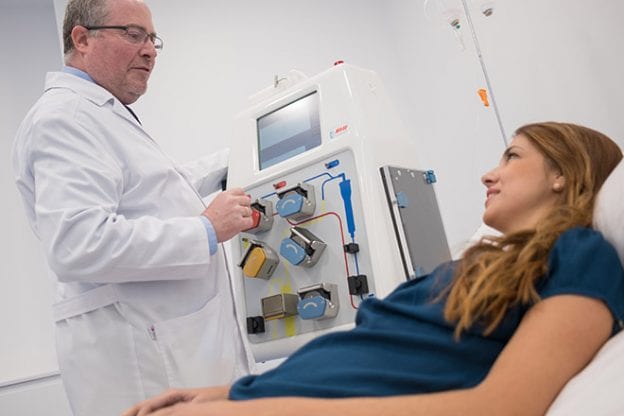
Biosalud Day Hospital: preventing illness before it arrives
Wellness, meaning wellbeing, as applied to medicine, is defined as: an approach to health care that emphasises the prevention of disease and in prolonging life, instead of emphasising treatment of disease. Or also as the quality or state of being healthy, especially, as a result of a deliberate effort.
From these definitions, it can be deduced that this is an area of medicine that focuses on prevent the onset of diseases better than treatments. that can be done once the disease has already manifested itself. And this, as a result of a deliberate effort by the patient and the medical team that attends him or her, in a constant, programmed and individualised manner. This idea fully coincides with the intention and line of action that Biosalud Day Hospital has always had.
Our prevention programme combines genetic analysis, with which we can detect a patient's predisposition to disease, with attention to their current state of health. In this way, we can design a treatment plan that prevents the development of disease
The rationale for a prevention programme
Increasing the focus on prevention helps to improve people's health, quality of life and prosperity.
Focusing on preventing diseases before they occur will create healthier individuals, families, workplaces, schools and cities so that individuals can lead long and productive lives and reduce health care costs.
With better health, the children go to school longer and are better able to learn. Numerous studies have found that regular physical activity supports better learning. Student proficiency levels have been correlated with academic achievement, including improved maths, reading and writing scores.
Health prevention also manifests itself in the labour productivity. With better health, adults are more productive and work more days. Preventing disease increases productivityasthma, hypertension, smoking and obesity reduce annual productivity per person.
With better health, older people maintain their independence. Supporting older adults who choose to remain at home and maintain their independence helps to promote and maintain positive mental and emotional health.
Investments in lifelong prevention complement and support treatment and care.. Prevention programmes can be cost-effective, reduce health care costs and improve productivity.
A plan to improve health and well-being

Disease prevention starts in our workplaces and at home, not just in the doctor's office.. For example, companies can adopt practices to encourage employees to increase physical activity and reduce pollution (e.g. workplace flexibility, ridesharing programmes, park and ride incentives and telecommuting options).
It is also necessary to expanding quality preventive services in clinical settings. When people receive preventive care, such as immunisations and cancer screenings, they have better health and lower health care costs. For example, diabetes prevention programmes, which support preventive efforts among underserved groups and can improve access to preventive services.
Another point of the plan: empowering people to make healthy choicesA preventive health programme can make healthy choices an easy and affordable option, and when people have access to information and resources that are easy to understand and implement, they are empowered to make healthier choices. For example, health professionals can use multiple communication tools (e.g. mobile phone apps, personal health records and credible health websites) and culturally competent methods to support more traditional written and oral communication.
Eliminating health disparitiesBy eliminating disparities in health attainment and maintenance, we can help improve the quality of life for all citizens. For example, private hospitals, such as Biosalud Day Hospital, can train and hire more qualified staff from underrepresented racial and ethnic minority groups and people with disabilities.
The seven priority areas of a preventive health strategy or plan are:
- Tobacco-free life
- Prevention of drug abuse and excessive alcohol consumption
- Healthy eating
- Active life
- Life free from violence and injury
- Reproductive and sexual health
- Mental and emotional well-being
Taking care of our health is a way to prevent ageing and the onset of diseases.
At Biosalud Day Hospital we know that health care can prevent ageing and the onset of disease. Our preventative approach combines the use of genetic analysisThe patient's predisposition to disease can be detected, with the study and attention to the person's current health status . In this way, we can design a treatment plan with a strong focus on disease prevention before the onset of the disease.

This concept is totally innovative, as our approach is oriented towards the performance of various diagnostic tests and a set of therapeutic techniques that allow us to achieve maximum effectiveness.
- Preliminary testsBioscan, Biocheck, Ford, Fort, FoodINT, FoodGEN,
- Therapeutic techniquesMattech, specific and personalised orthomolecular serotherapy, electromagnetic bioregulation therapy, organic-cellular biostimulation therapy, mesostimulation of the liver, acupuncture, GAH ozone and photon therapy.
- Therapeutic apheresis Inuspheresis@: we are the only one in Spain authorised to carry out INUSpheresis® treatments, a medical procedure that represents a drastic evolution of therapeutic apheresis, and which is highly effective in the preventive treatment of ageing.

